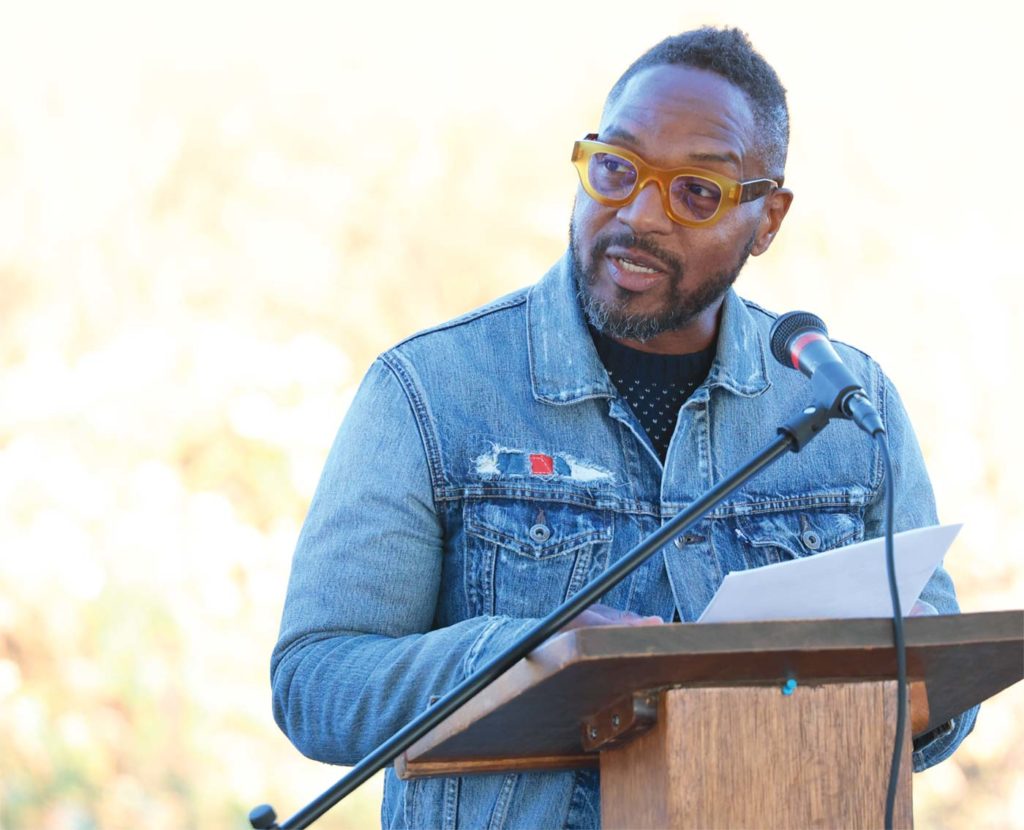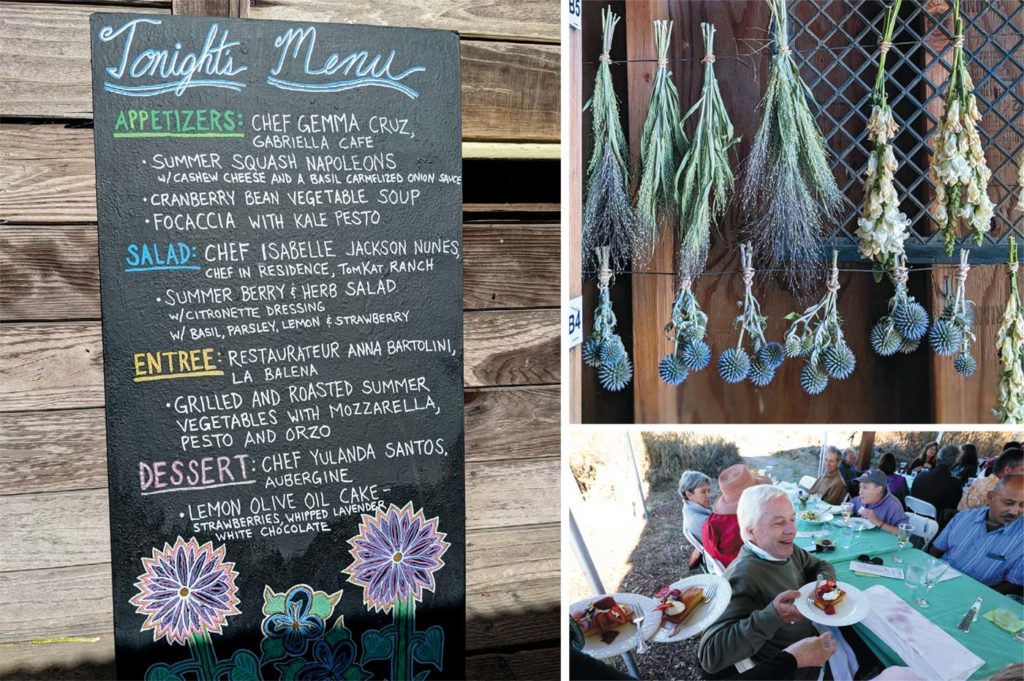PHOTOGRAPHY BY MARK C. ANDERSON AND SHMUEL THALER

BLACK FOOD
Bryant Terry typically takes a few years off between cookbooks.
That makes sense. His books are behemoths. In concert with his cooking, they win James Beard and NAACP Image Awards. They require cooking, re-cooking, writing, re-writing, testing, re-testing, sweating, editing, photographing, touring and not enough sleeping.
Plus he’s got another thing or two going on: He directs a publishing imprint and his own creative studio—the latter with his wife and daughters— and he’s chef-in-residence at the Museum of the African Diaspora in San Francisco, where he designs events around the intersection of food, farming, health, activism, art and culture.
But no gap between books this time.
Because…early summer 2020. Terry’s scheduled tour for a previous book was interrupted by COVID. Then he was engulfed by a reckoning in the wake of George Floyd’s murder and so many more before it.
“This country was being forced to look at a lot of its ugly past and ways to move forward,” he says. “That was the impetus for me to start work on another book right then, to share conversations I was having… with the world.”
Flash ahead two years and Terry is quoting an original poem from that latest book, Black Food: Stories, Art & Recipes From Across the African Diaspora, at the Homeless Garden Project’s farm on the westside of Santa Cruz.
“Rice” is a poem by farmer- activist-anthropologist Dr. Gail Myers that sprawls across millennia, forced migration and staggering loss, but refuses any separation of nourishment from the past.
We are rice people first.
We see beauty in the wind,
We taste truth in the rain.
For this dish we made to remember
the six million souls beneath the sea.
We are rice…
After five books of his own—including Vegetable Kingdom and Vegan Soul Kitchen—Black Food summons a vast anthology of art, photography, poetry, essays, personal narratives and mouthwatering recipes, all curated and edited by Terry.
So it felt fitting he curated others for the talk at HGP.
“This food is the gift of the whole universe, the earth, the sky and much hard work,” was the next thought he shared, drawing from Buddhist monk Thich Nhat Hanh’s “Five Contemplations,” which closes with, “We accept this food in order to realize the path of understanding and love.”
By eating mindfully, Terry continued, a simple meal transforms into “a deep experience” and heightens awareness not only of tastes and textures but also the toil, soil, air and heritage that go into it.
“Everything is connected,” he said.
Those ideas led his keynote at the Homeless Garden Project’s annual Sustain Supper fundraiser. Before the vegetarian meal, supporters got a tour of HGP’s 3.5 acres in Santa Cruz, where trainees learn farming while supplying the county’s first ever community-supported agriculture subscriptions (and one of its most robust, to this day).
HGP merits a pilgrimage to pick up produce from the storybook farmstand or simply soak up the setting: The dried-flower barn, which helps furnish finished products like salves, teas, hand-dipped candles and cookie mixes at its downtown retail spot, is among the must-sees.
“Our model is built around people doing things for themselves, not anything being done for them,” HGP executive director Darrie Ganzhorn says.
Or as Bryant said at Sustain Supper, “What impresses me about the Homeless Garden Project is everything is connected.”
He isn’t exaggerating. HGP connects urban to agricultural, neglect to opportunity, food to belly, on-site training to 14-step job counseling and post-program housing.
Ganzhorn expands on that.
“The farm offers a place of belonging. It offers safety. It offers a lot of tangible feedback: Trainees plant a seed and see it grow, they tend it and see it flourish, they harvest and feed our team—and our community— fresh, healthy, organic produce,” she says. “The farm helps all of us who come there take better care of ourselves and each other.”
Back at the HGP podium, Terry put it poetically: “Sustainability and sustenance must be braided together.”
Across 309 pages and 111 contributors, through various artistic mediums (including a playlist), diverse geographies and far-ranging ingredients, Black Food braids together the African diaspora in countless ways.

The copy Terry signed for me will live at Lifelong Medical Care’s East Oakland Clinic to help patients discover recipes grounded in health and inherited history.
But it won’t be getting there as soon as planned, because I started reading it and can’t put it down.
Not for the recipes, though they look damn good—from coconut cornbread pudding to okra-and-shrimp purloo to Terry’s own Dirty South hot tamales with cilantro sauce.
It’s for the essays like chef Thérèse Nelson’s, which deftly describes, in part, how civil rights victories liberated Blacks from the kitchen just as it was becoming a place of prestige, and how closely tied Black cooking is to the wider planet’s, drawing connections previously hidden behind ignorance.
When Terry signs the inside of Black Food, he writes in Sharpie, “May this book inspire!” It does that from the start of his intro, with another curated quote, this one from Audre Lorde: “Sometimes we are blessed with being able to choose the time, and the arena, and the manner of our revolution, but more usually we must do battle where we are standing.”
That battle, he told Edible later, doesn’t need to happen with marches or community canvassing (though they help mightily).
“Sometimes we are blessed with being able to choose the time, and the arena, and the manner of our revolution, but more usually we must do battle where we are standing.”
“Like many people do, I used to default toward what I thought activism is: agitation and base building,” he says. “For me it was important to broaden activism: There are many ways we can imagine and practice it. Being on the streets isn’t going to work with everyone. Base building isn’t going to work for everyone. Like I said at [HGP], you can contribute time and talent and treasure, and by learning, volunteering, reading and writing.”
His work collaborating on MoAD events inspired Black Food, which in turn generated Black Food Summit, coming September 9–10. Day One happens at MoAD with panels on publishing, storytelling and design, followed by a reception with sips, small bites and records spun by DJ Max Champ. Day Two follows at TomKat Ranch in Pescadero, with a slate of “experiential learning and communal leisure” ranging across hikes, reflective writing, gardening, breathwork and even equine activities, and concluding with a community supper made by standout Black chefs from the Bay Area.
The summit’s operating premise harkens back to Terry’s seminal work launching New York City nonprofit b-healthy (Build Healthy Eating and Lifestyles to Help Youth), a longitudinal initiative designed to empower youngsters to fight for a more sustainable food system.
“Like we will with [Day Two’s events] we would use cooking to start with the visceral to ignite the cerebral and end with the political,” he says.
So while the message sounds like a hippie mantra—everything is connected—here’s the thing: If audiences receive the truths Bryant Terry teaches, and observe its vibrations at the Homeless Garden Project, what sounds kumbaya is a call to battle.
The battle is not a simple one or an easy one—or one that can be done alone.
It comes in sowing connections like those leaping from the pages of Black Food and the soils of Santa Cruz.
And it’s a worthy battle, accompanied by a lot of incredible food.
HOMELESS GARDEN PROJECT STORE
1338 Pacific Ave., Santa Cruz
homelessgardenproject.org
About the author
Mark C. Anderson, Edible Monterey Bay's managing editor, appears on "Friday Found Treasures" via KRML 94.7 every week, a little after 12pm noon. Reach him via mark@ediblemontereybay.com.
- Mark C. Andersonhttps://www.ediblemontereybay.com/author/markcanderson/
- Mark C. Andersonhttps://www.ediblemontereybay.com/author/markcanderson/
- Mark C. Andersonhttps://www.ediblemontereybay.com/author/markcanderson/
- Mark C. Andersonhttps://www.ediblemontereybay.com/author/markcanderson/



